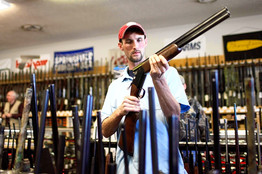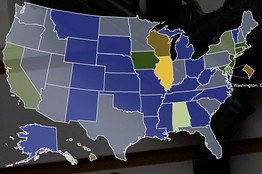By VANESSA O'CONNELL And GARY FIELDS
Monday's high-court decision expanding gun rights will likely trigger a flood of litigation in states and cities with restrictive laws, so it could take years before the practical impact of the ruling is clear.
The ruling requires states to respect a federal right under the Second Amendment to keep and bear arms, but it doesn't say specifically how broadly the right extends. That means existing regulations must be weighed by federal judges who will have to interpret the Supreme Court's vague language.
Gun-rights groups are preparing to file suits in states with restrictive laws—in particular New York and California—while groups favoring gun control said they were confident most rules would pass constitutional muster.
Among the restrictions likely to be in play are assault-weapons bans, registration rules and state laws that give governments permission to suspend certain gun rights in emergencies.
Wayne LaPierre, executive vice president of the National Rifle Association, said, "We're going to go everywhere cynical politicians attempt to pervert, defy or nullify the decision."
He said one target for court challenges would be New York City's gun laws. The city requires owners of handguns, shotguns and rifles to register the weapons, hold licenses or carry permits.
Alan M. Gottlieb, founder of the Second Amendment Foundation, another gun-rights group, said the group filed a lawsuit Monday in federal court challenging a North Carolina statute that bars possession of firearms off of one's property in areas where there is a declared state of emergency.
"We wouldn't have been able to challenge" the law "without this decision," Mr. Gottlieb said. "We had this ready to go."
The decision is also likely to affect two California cases filed by gun-rights group Calguns Foundation that were put on hold pending the outcome of the Supreme Court case. Those cases challenge California's method of issuing gun licenses and its list of handguns designated unsafe.
Up in Arms
See a breakdown of gun-related legislation state-by-state.
Many state constitutions already recognize gun rights. California is one of at least six that don't have such a right, said Calguns Chairman Gene Hoffman and other experts.
The Supreme Court ruling affected handgun bans in Chicago and Oak Park, Ill. It follows a 2008 decision that struck down a handgun ban in the District of Columbia. Many of the rules in localities around the country are less broad, requiring only registration, background checks and the like.
The Supreme Court rulings "have to do with handgun bans" and "don't provide a strong basis for challenging other laws," said Joshua Horwitz, executive director of the Coalition to Stop Gun Violence.
In Chicago, officials Monday said they were already drafting a replacement ordinance, although Mayor Richard M. Daley was mum on details. The mayor said he would support both required gun registration and liability insurance for firearms owners in any future law. "We are a country of laws. Not a country of guns," Mr. Daley said, criticizing the high court.
As it reviews its options, Chicago may take some cues from Washington, D.C.
The 2008 ruling in District of Columbia v. Heller forced the capital to revamp its gun laws, but its restrictions are still among the most stringent in the nation.
"We have battled the demons for over a year, dealing with Heller," said Peter Nickles, the district's attorney general. The district now requires gun owners to get five hours of safety training, register firearms every three years and to undergo two criminal checks—one by the police and the second by the gun dealer.
"We have what we consider to be a careful balance between safety and the Constitution," Mr. Nickles said.
Gun-rights groups disagree. They say the district's rules don't comply with Heller and have challenged them in federal court as unconstitutional. A federal district judge ruled earlier this year in favor of the district, and that decision is being appealed.
"I would expect it's going to be years and years of litigation," Mr. Nickles said.
Gun owners welcomed the ruling as an affirmation of what they had preached for years.
At Sharpshooters Small Arms Range in Lorton, Va., the crack of small-arms fire echoed from the 16 separate lanes at the indoor range where shooters practiced.
Paul Swiergosz, a 43-year-old retired Army officer, said he returned from a tour in Iraq to Fort Drum, N.Y., only to learn that getting a permit for a handgun was difficult, even for someone who had carried one on behalf of the nation just months before.
Mr. Swiergosz, who was at the range with his 18-year-old daughter, said "it'd be nice if they annotate" the decision and spell out some of the regulations that states can no longer impose. "It would appear there will be more court cases. It's a big step though," he said.
—Douglas Belkin and Daniel Yadron contributed to this article.
Copyright ©2010 Dow Jones & Company, Inc. All Rights Reserved To subscribe or visit go to: http://online.wsj.com


![[GUNS]](StateRegulationGuns.gif)